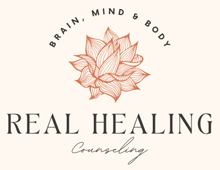I have worked with so many people who begin therapy by stating “I had a perfect childhood” and yet they are exhibiting symptoms of trauma and abuse.
Immediately my attention is drawn to the word “perfect”. If you stick around and hear me talk about Pia Mellody long enough, you’ll hear “perfect” as an all-or nothing, black and white thinking, unrealistic thing, too.
Because of our imperfect nature, no one is perfect, and because no one is perfect, no one’s childhood is perfect.
I jokingly, not so jokingly always say “none of us get out of this thing called childhood unscathed”. Especially because humans are the mammals who have the longest period of childhood and brain development.
Children depend on their primary caregivers for their survival. They are unable to fend for themselves, to take themselves out of unsafe, abusive or neglectful situations. Instead, they adapt. They blame themselves.
If their caregivers are unable or unwilling to soothe them, they will find something else to soothe themselves, such as fantasy, masturbation, or food (these are a few that are easily accessible to children).
They receive messages about themselves and the world by the way their caregivers relate to them.
In an ideal world, our parents, who are perfectly imperfect, are “good enough” parents. In this case, our parents (are good enough at) validating, affirming, nurturing, and setting healthy limits for us.
We receive the messages that we matter, we are loved and cared for, relationships are safe, we and our boundaries are worthy of being protected, etc.
Unfortunately, that is not always the case.
Too often parents have their own unresolved traumas that prohibit their capacities to be there for their children in the way they need them to be. For example, the parents who grew up with emotionally absent parents, who have been invalidated often invalidate their kids, parents who don’t know how to self-soothe themselves may not know how to self-soothe their kids, and this is especially problematic because children learn how to self-soothe in healthy ways through attachment with their primary caregiver and appropriate mirroring (this process is called co-regulation).
Even when our parents love us deeply, they may not have been able to take care of us in the way we needed them to and that’s okay. It’s actually not about them. It’s about you. It’s about your healing
It’s also not about blame. It’s about holding them accountable in your own process and thus releasing the shame you’ve been carrying, feelings of not being good enough or a deep sense of unworthiness, which are often the messages received from a less than nurturing childhood experience(s).
I’ll never forget the time my client said “I’m an adult today. Thank God” with a sigh of relief. This is a reference for the fact that she can take care of her inner child from her adult Self in the way she always needed.
Below are the definitions of less than nurturing childhood experiences according to Pia Mellody.
Types of Trauma Information
courtesy of Pia Mellody
“Trauma occurs from any experience in childhood that is dysfunctional or less than nurturing.” – Pia Mellody, in Facing Codependence
-
Physical Trauma. Includes abject abuse, use of implements, face slapping, shaking the child, hair pulling, head banging, tickling a child into hysteria, lack of appropriate physical nurturing, and intrusive procedures.
-
Physical-Sexual Trauma. Includes sexual intercourse, oral sex, anal sex, masturbation of a child, having a child masturbate an adult, sexual touch and/or fondling, sexual kissing and sexual hugging.
-
Overt-explicit sexual trauma. Includes voyeurism, exhibitionism, and verbal sexual trauma.
-
Emotional-sexual trauma. Involves emotional enmeshment by the parent or caregiver.
-
Covert-sexual trauma. Occurs when a parent or caregiver does not set appropriate sexual
boundaries for a child. It also occurs when a child witnesses sexual trauma.
-
Intellectual Trauma. Includes attacks to a child’s thinking process, not validating a child’s thoughts or feelings, over-control of the expression of a child’s thought and failure on the part of a major caregiver to teach logical thinking and problem solving.
-
Emotional Trauma. A parent or caregiver refuses to allow a child to express feelings, shames a child for his/her feelings or demonstrates improper expression of his/her feelings in front of a child. Wrongful punishment. Strict discipline, neglect.
-
Spiritual Trauma. Includes a parent or caregiver being disrespectful of the child’s
reality, demanding to be a child’s higher power, demanding perfection, over-controlling, ignoring, neglecting, abandoning, or indulging a child. The parent or major caregiver may be a religious addict, or the child maybe traumatized by a religious leader. Spiritual trauma also occurs when a parent or major caregiver does not follow the established family rules or values as though he or she is above those rules and values. All relational trauma is spiritual trauma because it teaches the child to be one up or one down. “One-up or one-down” means in the better-than, or less- than position in a conversation. Many parents “talk down” to their children, especially when angry, and this would be an example of that.
Other types of trauma. Other types of trauma include peer or social trauma for reasons of race, religion, sexuality, and or physical appearance.
-
Overt and covert abuse.
-
Passive v active trauma
-
Disempowering v. falsely empowering abuse.
-
Enmeshment v. abandonment.

